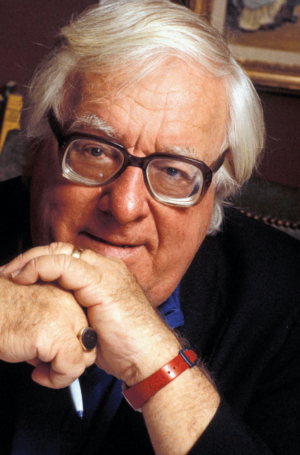
As I’m sure there will be plenty of retrospective looks at Mr. Bradbury’s body of work and career (at least 500 published books, produced plays and filmed screenplays), I just wanted to share some thoughts I have about Bradbury stories and novels.
For some reason I always felt an affinity for Ray Bradbury as he was born and raised in the town of Waukegan located in the suburban Chicago area. Having grown up in Chicago, and spending around thirty five years in the city, I always looked at Bradbury as a hometown author although I’m pretty sure he had moved along to California long before I ever picked up my first dogeared copy of The Martian Chronicles. Fahrenheit 451, Something Wicked This Way Comes, and his collections of short stories soon followed. I’m sure it’s a silly notion to think of Bradbury as a Chicagoan, but I know his upbringing in that small suburban town had a great impact on how he wrote and even how he lived. I know Bradbury shared my common love of libraries and all things promoting making the written word available to everyone.
For myself, I always gravitated to Bradbury when it came to the so called “big three” of science fiction: Asimov, Bradbury, and Heinlein. Asimov came across as a bit too dry and his characters never seemed to come to life; Heinlein wrote characters nicely but many of his novels were overly convoluted and scattered in my opinion; Bradbury centered his tales on people and the hard science wasn’t present as the fantastical trappings were nothing more than a device to advance the sroty. I’ll be honest and say I’ve never been a big fan of “hard” science fiction and Ray Bradbury certainly didn’t fall into that category.
Ray Bradbury, to me, always wrote in a very Americana-ish way as he focused on both the optimism and the anxieties of his own postwar America. As a kid reading SF and horror in the late 1970s and early 1980s, during a time of relative flux in the consciousness of America – the true Viet Nam experience was coming to light and sinking in, inflation was staggering the nation, the peace and love of the 60s was a thing of the past, and America was looked on around the world as a punch drunk giant about to crash to earth – Bradbury’s stories called out to me as not only harkening back to the American spirit which created our great nation but also a harbinger warning of what could come to pass if we forgot our roots of independence in a quest for an illusionary safety in conformity. Ray Bradbury was our Norman Rockwell of science fiction, with the ability to draw our gaze into a slightly skewed mirror of reality (or, in many cases, an alternate reality) to remind us that in the end it’s only people who matter and all else is simply window dressing.
One last thing, that might not be tackled much by the folks writing about Mr. Bradbury, is the impact he had on the medium of radio. As a fan of old time radio, I can tell you some of the best stories of SF and horror could be found coming from the mind of Bradbury throughout the 1950s. A great many of our readers aren’t old enough to remember when three or four televisions weren’t a fixture in someone’s home. Trust me, I’m not old enough to remember that either, but as a fan of great storytelling – regardless of the medium – I’ve listened to hundreds (maybe thousands) of radio shows from the past and when it comes to tales of the supernatural or far flung future many of the greatest were either penned by Bradbury or adapted from his stories on shows like Dimension X, X-Minus One, Ray Bradbury Theater, and many more! I’ll share one of my favorites here, Mars is Heaven which later became part of The Martian Chronicles, from Dimension X which aired on July 7th, 1950:
Download the show to take on the go right here.
In the end, I’m sure Ray Bradbury wasn’t much in the public consciousness over the past couple of decades and he wasn’t writing a whole lot of fiction but a true legend has passed. Hopefully, the outpouring of appreciation and affection for the master storyteller, that’s sure to come, will help to expose new readers to Bradbury’s work and bring a whole lot of joy to a generation who may not recognize the name.
- Chivalry & Sorcery Fifth Edition Reviewed - Nov 3, 2024
- Campaign Builder: Castles & Crowns Reviewed - Nov 2, 2024
- The Roleplaying Game of the Planet of the Apes Quickstart | First Look and Page-Through - Nov 1, 2024